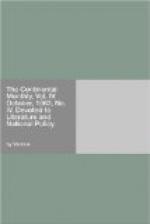With the Greeks, the Graces were also the Charities or Loves. It is the love for living things and the sympathy felt in them that induce the poet to give life and feeling to the plant, as Shelley to the ’Sensitive Plant;’ as Shakspeare, when he speaks to us through the sweet voices of Ophelia and Perdita; as Wordsworth, in his poems to the Daisy, Daffodil, and Celandine; as Burns in his Mountain Daisy. As a proof of the power of the Imagination, through its Truth, and Love, to invest the lowest of God’s creatures with interest, we offer the reader one of these simple songs of the heart.
TO A MOUSE.
On turning her up in her nest with the plough, November, 1785.
Wee, sleekit, cow’rin, tim’rous beastie,
O, what a panic’s in thy breastie!
Thou need na start awa sae hastie,
Wi’ bickering brattle!
I wad be laith to rin an’ chase
thee,
Wi’ murd’ring pattle!
I’m truly sorry man’s
dominion
Has broken nature’s social union,
An’ justifies that ill opinion
Which makes thee startle
At me, thy poor earth-born companion
An’ fellow mortal!
I doubt na, whyles, but thou may
thieve;
What then? poor beastie, thou maun live!
A daimen icher in a thrave
‘S a sma’ request;
I’ll get a blessin’ wi’ the lave
An’ never miss’t!
Thy wee bit housie, too, in ruin!
Its silly wa’s the win’s are strewin’!
An’ naething, now, to big anew ane,
O’ foppage green!
An’ bleak December’s winds ensuin’,
Baith snell and keen!
Thou saw the fields laid bare an’
waste,
An’ weary winter comin’ fast,
An’ cozie here beneath the blast,
Thou thought to dwell,
Till crash! the cruel coulter past
Out thro’ thy cell.
That wee bit heap o’ leaves
an’ stibble,
Has cost thee mony a weary nibble!
Now thou’s turned out, for a’ thy trouble,
Nor house nor hald,
To thole the winter’s sleety dribble
An’ cranreuch cold!
But, mousie, thou art no thy lane,
In proving foresight may be vain:
The best laid schemes o’ mice an’ men
Gang aft agley,
An’ lea’e us nought but grief an’
pain,
For promised joy.
Still thou art blest, compared with
me!
The present only toucheth thee:
But och! I backward cast my e’e,
On prospects drear;
An’ forward, though I canna see,
I guess and fear!
Poor Burns! Seventy years and more have passed since that cold November morning on which he sang this simple and tender song, yet it is as fresh in its rustic pathos, bathed in the quickening dews of the poet’s heart, as if it had sprung from the soul but an hour since: and fresh it will still be long after the fragile hand now tracing this tribute to the heart of love from which it flowed shall have been cold in an unknown grave!




